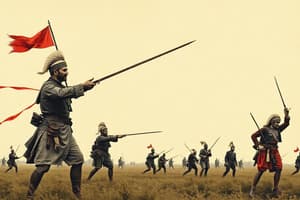Podcast
Questions and Answers
What was the primary cause of the French and Indian War?
What was the primary cause of the French and Indian War?
- Disputes over Native American trading rights
- Competing territorial claims over the upper Ohio River valley (correct)
- Religious tensions between French and British settlers
- Differences in economic policies between France and Britain
Which of the following best describes the broader significance of the French and Indian War?
Which of the following best describes the broader significance of the French and Indian War?
- A conflict to determine which national culture would dominate North America (correct)
- A battle for control of the Caribbean islands
- A disagreement on trade routes with Asia
- A war over religious freedom in the colonies
Who led the British forces with an unsuccessful attempt to expel the French from the Ohio River Valley?
Who led the British forces with an unsuccessful attempt to expel the French from the Ohio River Valley?
- General Monongahela
- Colonel Ohio
- General Braddock
- Lieutenant Colonel George Washington (correct)
What was the outcome of the Battle of Monongahela on July 9, 1755?
What was the outcome of the Battle of Monongahela on July 9, 1755?
What was a significant consequence of the French and Indian War?
What was a significant consequence of the French and Indian War?
How did the French and Indian War impact North America?
How did the French and Indian War impact North America?
What was a significant consequence of the French and Indian War for the British?
What was a significant consequence of the French and Indian War for the British?
Which of the following key figures played a significant role in the capture of Quebec?
Which of the following key figures played a significant role in the capture of Quebec?
What was a contributing factor to the American Revolution following the French and Indian War?
What was a contributing factor to the American Revolution following the French and Indian War?
Which of the following was a major battle during the French and Indian War?
Which of the following was a major battle during the French and Indian War?
What was a significant impact of the French and Indian War on North America?
What was a significant impact of the French and Indian War on North America?
Who was appointed as the commander of British forces in 1757, reorganizing military leadership and strengthening relations with colonists?
Who was appointed as the commander of British forces in 1757, reorganizing military leadership and strengthening relations with colonists?
Flashcards are hidden until you start studying
Study Notes
The French and Indian War, also known as the Seven Years' War in Europe, is one of the most significant conflicts in North American history. Lasting from 1754 to 1763, this war pitted France and Britain against each other for control of the North American continent. This article will explore the causes, major battles, key figures, consequences, and impact on North America of this influential event.
Causes
The French and Indian War emerged from ongoing tensions over competing territorial claims. The upper Ohio River valley was a contested region, with the British claiming it as part of their territory and open for trade and settlement, while the French viewed it as part of their empire. Beyond this immediate issue, the broader question of which national culture would dominate the heart of North America was at stake. English settlers were predominant in the desired area, but French exploration, trade, and alliances with Native Americans were prevalent.
Major Battles
The war began in earnest in 1754 when the French and British clashed over control of the Ohio River Valley. British forces led by Lieutenant Colonel George Washington attempted to expel the French, but they were defeated and Washington's reputation suffered greatly. One of the most disastrous battles for the British was the Battle of the Monongahela on July 9, 1755, where General Braddock's force of over 1,500 regulars and provincial soldiers was routed by the French. The tide turned in favor of the British in 1757 when Britain appointed William Pitt as the commander of their forces, who reorganized military leadership and strengthened the Crown's relationship with colonists. In 1759, British armies under Pitt invaded Canada and conquered strategic fortresses such as Ticonderoga, Niagara, and Quebec.
Key Figures
Key figures in the French and Indian War include George Washington, who gained valuable military experience during his involvement in the war; John Forbes, who led a successful expedition to seize Fort Duquesne from the French after Braddock's defeat; and General James Wolfe, who played a significant role in the capture of Quebec.
Consequences
The consequences of the French and Indian War were far-reaching. Great Britain secured enormous territorial gains in North America, including all French territory east of the Mississippi River, Spanish Florida, and other territories claimed by the British before the conflict. However, these victories came at a cost. Subsequent British policies concerning taxation and westward expansion resulted in widespread colonial discontent and ultimately contributed to the American Revolution.
Impact on North America
The French and Indian War had a profound impact on North America. It determined control over vast colonial territories and influenced the development of American society. The establishment of the Proclamation Line of 1763 restricted colonial expansion beyond the Appalachian Mountains, leading to tensions between settlers and the British government. Additionally, changes made to management of Indian affairs further fueled dissatisfaction among the colonists. These factors combined with earlier incidents leading up to the war laid the groundwork for the American Revolution.
Studying That Suits You
Use AI to generate personalized quizzes and flashcards to suit your learning preferences.




